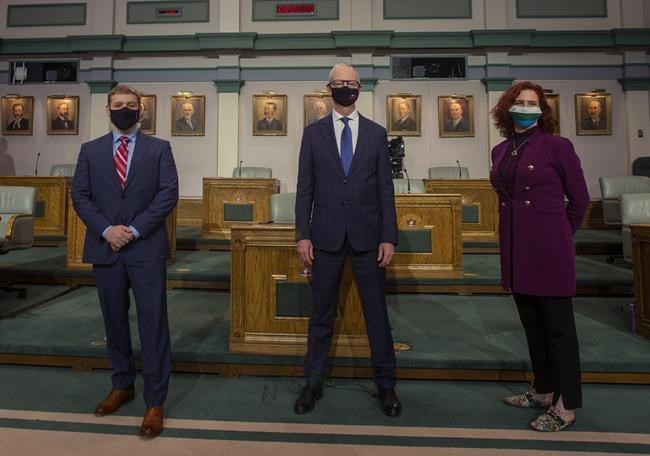ST. JOHN'S, N.L. — Amid climbing COVID-19 case numbers, Newfoundland and Labrador election officials have postponed voting in Saturday’s provincial election for nearly half the province's ridings.
Elections NL said in a news release Thursday that with community spread in the St. John's region, polling station workers were backing out in droves over fears of contracting and spreading COVID-19.
In-person voting has been postponed in 18 of the province's 40 ridings, stretching from St. John's and its neighbouring city of Mount Pearl to the town of Carbonear, about 100 kilometres away.
"Many election workers have resigned out of fear of interacting with the public on election day," chief electoral officer Bruce Chaulk said in the release. "We cannot hold traditional polls without the support of these people."
Voting will proceed as scheduled in other parts of the province, but the results will not be released until all voting in the province has concluded. Mail-in voting options have also been extended.
Elections NL is calling the delay a "two-week circuit break." In a subsequent news release, Chaulk said if the COVID-19 numbers improve over the two weeks, voting would be rescheduled.
"However, based on the continually increasing COVID cases being reported in the region, there is no guarantee that we will be able to administer in-person voting safely at that time," he said. He encouraged people to vote by mail-in ballots "to ensure the ability to participate in this election."
The announcement came after Chaulk sent a letter Thursday to party leaders and independent candidates saying the growing community spread of COVID-19 constituted "a serious occupational health and safety issue" for poll workers.
"The current significant outbreak has had a profound impact on our ability to conduct a fair election, and immediate action is required to be taken," he wrote.
Provincial health authorities reported a record 100 new cases of COVID-19 Thursday, a day after partial lockdown measures were introduced in the St. John's region.
After an initial outbreak and lockdown last spring stemming from a funeral in the provincial capital, pandemic life for Newfoundlanders and Labradorians had been relatively normal, with daily case numbers in low single digits. That changed this week, after an outbreak began in Mount Pearl. On Thursday, officials said there were 210 active cases in the province — 194 of which were announced this week — and they expect that number to grow.
"I think people felt that COVID wasn't here, we've been doing so well," chief medical officer of health Dr. Janice Fitzgerald said Thursday. "I'm not judging anybody, it's just what's gotten us here, and what we need to change, so that we can get ourselves out of here."
Progressive Conservative Leader Ches Crosbie said in a statement Thursday that Chaulk's decision "creates two classes of voters, and is therefore wholly unfair." Crosbie had called for the election to be delayed, but reiterated that he believes if voting is to be postponed, it should be postponed across the province.
"Simply put, some voters will have more time than others — and more access to information — to make their electoral decision," he said. "That is wrong and calls into question the integrity of the electoral process."
In a video call with media on Thursday afternoon, Liberal Leader and incumbent Premier Andrew Furey said Chaulk's decision was welcome. He disagreed that staggered voting times would put anyone at an advantage. "These are different circumstances, so I think Mr. Chaulk did what was necessary in extending the (mail-in) ballots and delaying in-person voting," he said.
Furey called the election on Jan. 15, but has said repeatedly he has no authority over how it is run and whether it could be stopped. He told reporters Thursday he had no say in Chaulk's decision.
This report by The Canadian Press was first published Feb. 11, 2021.
The Canadian Press



